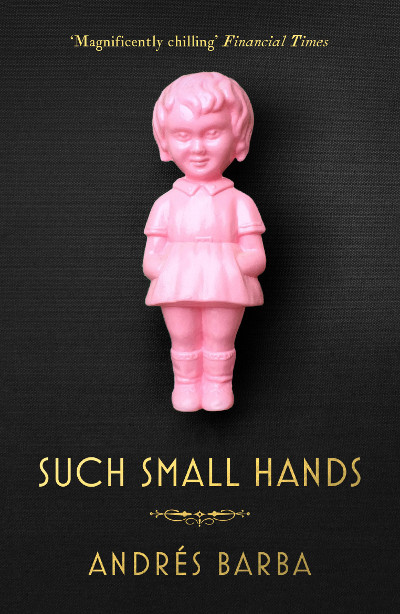 Such Small Hands by Andés Barba is an intense, eerie little book that beautifully captures the complexities and conflicts of childhood. Told initially through Marina’s eyes, it begins with one of the most vividly painted car crashes I’ve read, drawing you into the surreal cadence of a tragedy from the point of view of a seven-year-old girl: “The car falling, and where it fell, transforming.”
Such Small Hands by Andés Barba is an intense, eerie little book that beautifully captures the complexities and conflicts of childhood. Told initially through Marina’s eyes, it begins with one of the most vividly painted car crashes I’ve read, drawing you into the surreal cadence of a tragedy from the point of view of a seven-year-old girl: “The car falling, and where it fell, transforming.”
Before long, Marina learns to recite the appropriate lines: “My father died instantly, my mother in the hospital.” However, it is as though the enormity of the situation has rendered it inconceivable, so that she utters the words without the level of distress the grown ups surrounding her expect.
Confounding expectations is an enduring trait for Marina, as she goes on to unsettle the girls of the orphanage that becomes her home. Her strangeness is an enigma to the other children, attracting them and repelling them in equal measure.
After her doll is stolen and dismembered, Marina invents a game that the other girls can’t resist. Each night, she chooses one of them to be ‘the doll’, ordering the others to strip the chosen one naked and reclothe her in the scratchy dress allocated to ‘the doll’.
The game is frightening, and yet overwhelmingly alluring to the children. They are repulsed and discomforted, each night both dreading and longing to be selected.
But before Marina devises the game, author Andés Barba inserts a scene that chillingly foreshadows it.
A line of caterpillars, which they’ve been warned not to touch, marches across the playground, Marina, alone as she almost always is, watches the caterpillars with obsessive scrutiny. ”It made her dizzy to think that they were dangerous, that they stung. Marina picked up a stick. She thought of a number: four. She started counting from the head of the procession. One. Two. Three. Four. And the fourth one she jabbed with the stick.”
It’s an act so methodical, and so seemingly callous, and it sends a ripple of shock through the yard. In the second when she stabs the caterpillar, all the others stop moving, a detail that fascinates Marina. “How had the news travelled from one to the next?”
Interwoven with this moment of curiosity is Marina’s retelling of the story of the car crash to a psychologist, weaving in her mythologizing of that world-altering instant.
But in the present, the other girls have formed a circle around Marina and the caterpillar. “She could feel their breath, their bodies pressing against her back, a girl’s head peering over her shoulder. If she turned now, she’d kiss her accidentally.”
Mortality, the arbitrariness of violence and, deftly woven in, a hint of unuttered desire, all swarm the page and highlight the themes of this unsettling book in which the deadliest among us may equally be the most vulnerable.
The 2017 edition I read was translated from the Spanish by Lisa Dillman and published by Portobello Books.
What are you reading? Consumed by a particular scene? I’d love to know. I’m always happy to receive reviews and comments on books, art, theatre and film. Please send an email to JudyDarley(at)iCloud.com.
